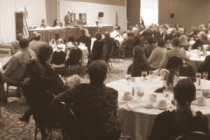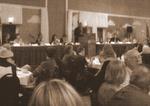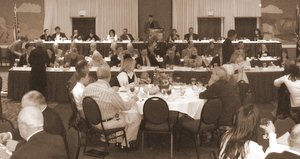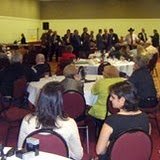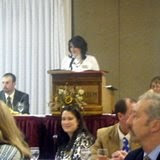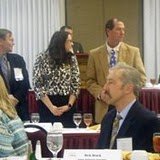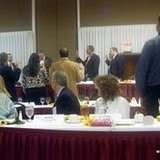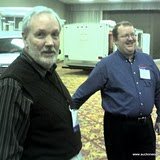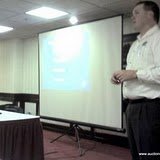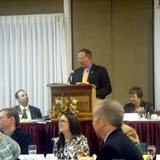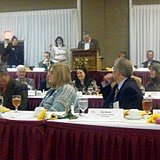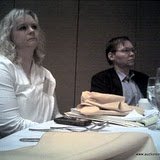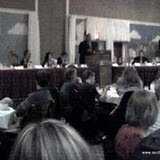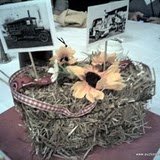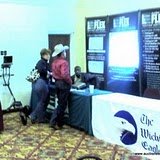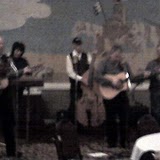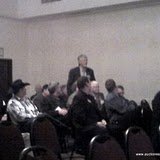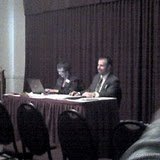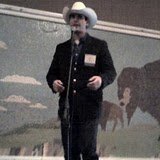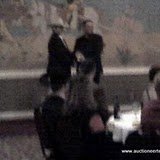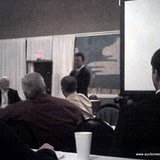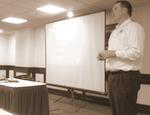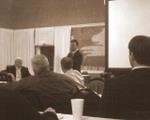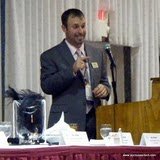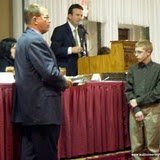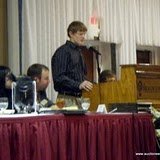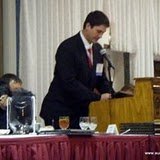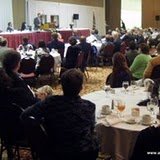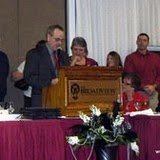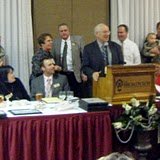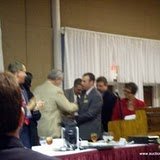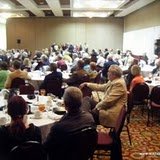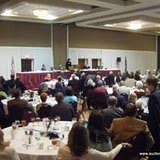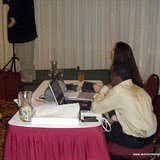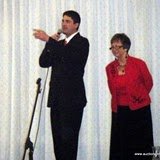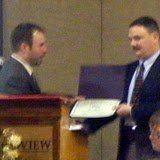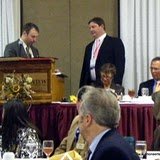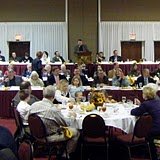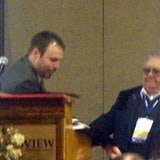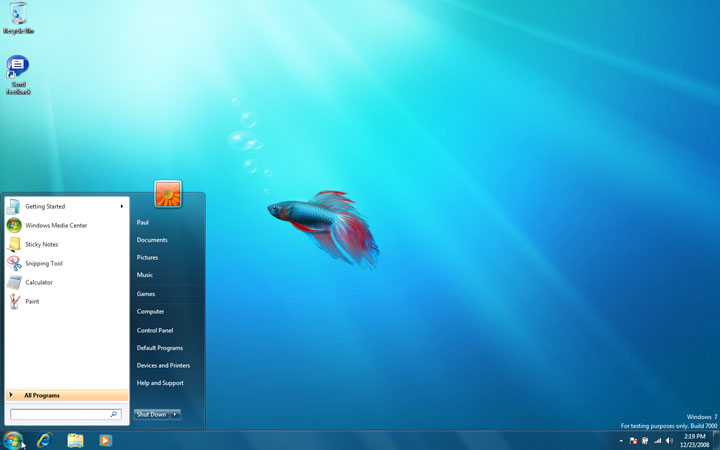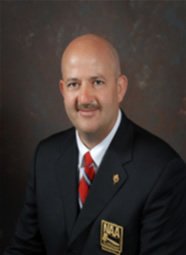
Scott Musser, BAS
AuctioneerTech – My name is Aaron Traffas and joining me today for the third in the Auctioneer Interview Series is my friend Scott Musser, BAS. Scott is an auctioneer for Musser Bros. from Kennewick, Washington, and is currently the president-elect of the National Auctioneers Association. He has previously served the NAA as Vice President, Treasurer and a member of the Board of Directors and is a past president of the Washington Auctioneers Association. Good afternoon, Scott, and thank you for joining me.
Scott Musser – Hello, Aaron. Thanks for having me on.
AT – You operate the Tri-Cities office of Musser Bros. there in Kennewick, but I know you have locations in Wyoming, Montana and Idaho. I know auctions run deep in your family. Who are Musser Bros., how did your family get started in the industry, and how did you branch out?
SM – Alright, thanks Aaron. Well, currently Musser Brothers is a combination of the four brothers, myself the youngest, then Merton in Billings, Randy in in Twin Falls and Harold in Cody. We are four brothers. We do have an older sister as well. She’s actually the oldest in the family. She’s not active in the business; she does participate from time to time. Our company was started back in the mid ’50s by our parents, Bob and Lillian Musser, back in Cody, Wyoming. They started out doing all kinds of sales. They had a little sale barn there. The older kids grew up working in the sale barn, holding up pots and pans and setting up chairs and sweeping floors. It ultimately grew out from that to doing a lot of equipment auctions and some real estate auctions and so forth. We really didn’t have any grandiose plan of growth; it just kind of morphed its way into what it is today. We all ended up in our different areas for one reason or another, but it came together kind of like it was planned but it really wasn’t. I ended up here. We did an auction out in Washington state and I came up here to help and thought it was kind of a neat area and moved up here and worked this area. Our Twin Falls office was really an outgrowth of a man that went to school with dad back in 1956. There was man by he name of Jim Messersmith. He’s actually a past president of the NAA. He and dad went to auction school together, and when he passed away from a heart attack we were in contact with his spouse – his widow – and took over his practice. It just kind of grew by fate and by time and today we do operate in primarily the five northwestern states and conduct farm equipment auctions and real estate auctions and machinery auctions and a little bit of everything in between.
So do you specialize at each of your locations in a specific kind of asset or do you all kind of team up when you book auctions? Do you have your individual specialties or do you all handle everything?
We really all do similar types of auctions. Certainly our bread and butter is still working for the farmers in our area selling equipment and land. That’s certainly our bread and butter, but we are morphing more and more into real estate. Probably one of the neatest things about our organization is that we do have, between the four brothers, we have a lot of expertise and some of us are more capable of handling and dealing with certain type asset groups. So if I get into a complicated real estate auction, well brother Harold out of Cody, he certainly is our real estate guru and has a lot of expertise in that. We’re pretty much all licensed in our respective states, but Harold just has a lot of expertise and is a lot of help when you get into a complicated real estate auction. So he’ll lend his support there. We each kind of bring our different strengths to the table and we’re able to blend that together into a really nice team.
I saw three bid calling titles for you on your bio on your website. You were the Northwest Auctioneer Champion in 2000, you won the IAC in 2001 and were the World All ‘Round Champion in 2002. Did you know always that you were going to be an auctioneer? How did you personally get started in the industry and how did winning the championships help or change your business?
Well I was probably the only brother of the four that I pretty well knew from when I was knee-high to a grasshopper I wanted to be an auctioneer. I loved the business, I loved listening to it, to work the auctions, of course, growing up. I just loved it and when I left high school I went right into the profession. I’ve had a love and an affinity for our profession since I can remember. I like to tell the story that, you know, a lot of kids when they’re growing up they take their toys and their matchboxes and they probably play on the floor and do all kinds of things. Well, when we were growing up we’d line our toys up and have auctions, we really did. We had a lot of fun at it. After that, going through and being involved with NAA and of course the state associations and so fourth, I think we’re all pretty staunch competitors and like to do things and I think the contests are great things for our profession. They certainly magnify and emphasize probably the most obvious part of the profession and that is, obviously, the auctioneer and the bid caller. I started participating at the national level in the IAC – I actually participated in the very first one in 1988. It was held in Kansas City, Missouri. I made it into the finals, but Paul Behr took the trophy away that year. Then I actually didn’t participate for a number of years. I think the next time I participated was in perhaps in the mid 90s, the early ’90s. Overall, I participated eight times and my eighth time I was able to take the trophy home out of Boise, Idaho. It just so happened that prior to that the Northwest Auction Contest – that’s the contest that’s really sponsored by our home state here in Washington but we invite auctioneers from the four or five northwest states to participate and I was able to win that up in Coeur d’Alene, Idaho. Then subsequent to winning the IAC, NAA put on a joint seminar up in Canada with the Canadian Auctioneers Association, and of course they host the World All Around Championship Contest, so I though, well I’m there, I’m going to enter it and get in. I was pretty fortunate that day and walked away with the hardware.
Has it done anything for your business, having won the championships, having the hardware under your belt, so to speak?
You know I have to say it has, because that was one thing I’m involved with in our profession that a lot of people don’t know is that I work as a contract auctioneer as well, primarily for one company over in Europe. It was them hearing about me – actually I hadn’t one the hardware yet, I had just placed as a runner-up, and they had heard about it and read about it. Just through fate and circumstances we connected. That was clear back in 2000, and subsequent to that I’ve made about 75 trips overseas and currently sell about 12 auctions a year in Germany and North Ireland.
Well you certainly keep on the move. You and your firm are geographically spaced out. What tools do you use – what technology tools or otherwise do you use – to keep you and your brothers and other staff and crew in constant collaboration and communication with each other?
Well, we do cover a vast area. If I was to leave my office and drive to Twin Falls and then up to Cody and to Billings and back to my office, I’d cover about 1700 miles, so it is a pretty wide geographic area. I think the favorite tool that we use is our airplanes. Three of the four brothers are private pilots. We use our airplanes a lot to travel back and forth to the auction sites and between the offices. We’re not 100% weather capable, can’t go in all weather and so forth, so sometimes we still end up behind the wheel driving that long road. The airplanes have been a great tool and we’ve used them and love them and enjoy them and have an affinity for aviation. Outside of that, on a technology basis, just plain old emails and being able to FTP things back and forth and send files back and forth and communicate virtually and have a conversation. We’re all in different time zones, so one person may not be available but the others are so using emails is a great tool. We do a lot of conference calling between us when we’re working on a project together. The Internet has just been a lifesaver for us, without it I don’t know what we would do – probably nothing.
I think you told me once, or maybe it was one of your brothers at one of the conventions, but I heard that somewhere around 20% of all the airplanes are for sale at any given time. Have you been fortunate enough to sell any aircraft at auction?
We have sold some aircraft at auction, not very many and it’s always been kind of a byproduct of another deal – I know we sold out a spray plane operation in Red Lodge, Montana. We had about four or five airplanes on that. There have been some other times subsequent to that that we’ve had and airplane hither and thither, but we’ve never been able to really leverage our affinity and our love for aviation and to really do anything big in selling airplanes. They’re kind of a complicated lot to sell. They have a complicated history, maintenance, etc. There have been a lot of folks who have tried to replicate, for airplanes, what’s done for automobiles and heavy equipment. They’ve never really gotten off the ground. I’m not saying that I think it never would – I think it would be kind of fun. In auctions, we all deal, obviously, in the auction method, and I think it’d be a great tool to give more liquidity to the aviation market because there is always – I think that 20% number might be a little bit high, I think it might be a little closer to 10 or 12 – but there’s always a constant amount of aircraft on the market and people looking for buyers and sellers looking for buyers. The auction would be a great model and maybe in the future something will come along that will make that a little bit better. They are fun to sell and there always seems to be buyers who are looking for them. People like to bid on them.
Scott, I see you are using ZenAuctioneer from RowdyData for your website. Are you happy with it? How easy is it to use? What do you like and dislike about it?
We made the transition to ZenAuctioneer just about a year ago this time – well, we’ve maybe been on it 14 or 15 months. At that time we were looking for a rebuild and, just by happenstance, I ran across the gentleman who owns RowdyData by the name of Joshua Stingle. Joshua is actually a webmaster from the state of Nevada. He’s responsible for about 45- 50 thousand pages of data for the state of Nevada. He has a personal relationship with some auctioneers in Colorado, and I was invited to speak at their convention a couple of years ago down in Colorado and as a byproduct of that I started receiving information, e-mails and so fourth, from their association. One of those happened to be an introduction to Joshua, and so I looked at his product and I really thought it was clean and concise and sharp and he seemed to be willing to try new things. We worked with him. It was really a neat transition and probably the easiest it has ever been to build a website. I think we did some things that are probably good learning lessons and lessons learned to make building the website and I think we all go through this and the first thing is, “What’s the look and feel going to be? What’s the content? How is it going to be navigated? How is it going to be organized?” You know, if you don’t spend a little time doing that background work on those items, then there are a lot of people who go to a web company and say, “Well, gee, I want a website,” when they really have no idea what they want and how they want to communicate it and how they want it to look and how they want their users to navigate around the site. It’s pretty difficult to start based on that. So, in this one, I actually used Apple’s product – they have a product called I-Web. Using I-Web, I designed primarily the look and feel and the navigation structure of our sight. I kind of knew what I wanted for the design and how I wanted it organized. That was a great stepping stone to start from, because we were then able to get that to Joshua and we had that loaded up on a back-end site and he could look at it and say, “Well, gee, we can accomplish that,” and “This here might be a little bit difficult, but yeah we can do that…” It was really a neat process, and, frankly, from the time I turned him loose until I was saying, “Okay, let’s go,” was only about 30 days, so in no more than a month we were live with our new site. We like it. It’s very simplistic. It doesn’t have a huge amount of back-end capabilities, but it does what we need it to do and I think sometimes we get overburdened with trying to do too much. It handles the things we want to do, we’re able to put our Google Analytic in the back end of it, get the kind of data that we want with feedback we want on traffic and users and things like that. I’ve been really happy with our relationship and with the outcome.
Well, I certainly agree with you on the importance of simplicity and having a site that is clean and lean and fast and usable, and your site certainly is. How many other auctioneers do you know who are using this product? Is this something that was custom made for you or is this a product on the market that auctioneers can use?
Well, his product, ZenAuctioneer, actually is an off the shelf deal that he provides as a background or back-end engine for an auctioneer’s website, and he made a tremendous amount of changes to it when we built our site. In fact, on his website he talks a little bit about it. We did a lot of things to stretch his capabilities and asked him to do a lot of changes. Those capabilities have thus been built into a new version of ZenAuctioneer. By accident, I ran across this site just the other day and when I looked I said, “Hey, this is a ZenAuctioneer site.” Since I don’t think he lists, I don’t have any way of knowing how many he has – you know, it might be as few as five or it may be as many as 15 or 20 that are using it today. He is not actively doing a big time marketing push, so it relies on word of mouth. He doesn’t have a big organization to serve hundreds of clients – I don’t think that’s his goal. He enjoys working with us and he does kind of understand us and what he want. He was a joy to work with. It was a lot of fun.
Before this interview started, I was having some technical difficulties and you gave me a little jibe, as you usually do whenever I get the chance to talk to you, about how I should switch to Macs. What software are you using to clerk and cashier your auctions? Did you find something that works on the Mac or on the web or do you have a Windows rig that you take? What is your solution for clerking and cashiering events?
Great question. You’re going to enjoy the answer. One of the nice things that happened on Macs is when they went to the Intel processors and, of course as you know, are able run two computers in one. I can have a Windows or a Mac or actually I have have both, in a virtual environment. So, we had been using a Filemaker-based accounting package for a couple of years and prior to that we were using a small little database program that I wrote. We used that for nearly 20 years for probably 2,000 auctions. It was really quick and dirty and did what we needed, but you know there were a lot of things we needed to start doing better and I just didn’t have the time or resources to dig back in and try to regenerate it. So, we started looking and in just this past year we converted over to Auction Flex. We run that on our Macs, but in a Windows environment and it’s really nice because at the auction sites we actually reboot our Macs into a pure Windows computer, so then the computer doesn’t think it’s anything other than a Windows computer.
So you’re using BootCamp for that rather than Parallels, is that right?
Correct. But, we use both products. At the auctions, we use BootCamp because we want to run the pure Windows environment and we don’t want to have any issues with the Parallels virtualization or anything like that. At the office here, if somebody calls and I need to look up a file, I just have Parallels open and I can zip right into Auction Flex and have my Parallels window open which gives me a window into my Windows computer, if you will. I can open up a report and print something out, or access the database and get any information I need to. But, at the auction we will just restart our computers into BootCamp and run them through a pure Windows environment. It’s been a great solution. We really like it. The girls love it. We went from the program that we had that I had written which was really simple to what I think is a real Cadillac. From having bar code readings and drivers licenses and things like that on registration, it’s just light years ahead of what we were. They think that’s really great. Perhaps, the biggest challenge we’ve faced right now, and Brandon and the staff at Auction Flex are working on some type of a solution to figure it out because we’ve not been the only company that has requested it, is that we’re still running multiple databases. There’s really no way to maintain a master database on a server and then download that and take that out to the auction, do the auction and come back, upload your auction results with buyers and consigners and all that and keep that in the master database in its current configuration. But it’s something we’ve asked them for and they’re working on and I know other users have talked to about, and I think that auctioneers are growing out and they’re opening up other offices, as you guys are, and it would be nice to have one master database, rather than having three, and that’s really the biggest challenge we’ve faced today in that regard.
I certainly know that problem all too well, as we’ve opened our additional locations and faced that same issue. Our solution was a lot more painful, for me at least, and that was to build a web-based system which has it’s benefits in that it’s light and fast and all you need is a web browser to use it, but the problem is that you have to have Internet to conduct auctions. And I know that that is not an option for everyone and we’ve certainly had some challenges with that. You know, the wireless cards and wireless routers that you can get have their limitations as well, so there is yet to be a perfect solution. Are you offering Internet bidding on the assets that you sell and what provider are you using for that?
Yes we are. We offer an Internet simulcast on the majority of our personal property auctions. We haven’t done much in the real estate end of it. We’ve utilized three different solution providers. We’ve used NAA Live a few times. We’ve used Proxibid quite a few times. And then we actually have the ability to run it ourselves, but in the recent past we’ve primarily used ProxyBid. And we’ve done that probably just because of the shear critical mass that they have. There are two different reasons for Internet bidding. One that most people don’t think about is the exposure factor. You know, you get your auction up on a platform in a portal like Proxibid and they’ve just got critical mass and enough eyeballs looking at assets and you gain some new bidders just using that for exposure. And obviously the second reason for Internet bidding is just the enabling technology – well, we’re enabling parties to bid on our assets that we’re selling at auction no matter where they are. So, it’s the comfort and convenience of being able to do that. That’s the primary reason- I think we’ve all gone to that and done that. So, the second reason is almost as important as the exposure in getting more buyers. I know it just kind of depends on the asset group that you’re selling. This fall we did an antique tractor auction, and I don’t think there’s probably a better portal or better exposure than Proxibid. There are a lot of people who are into antique tractors that watch that site a lot. I’ve heard the same thing about firearms and we’ve had some experience in that, too. We did a firearm auction a year and a half ago in south Idaho. We had a neat collection of western firearms and we had, this will be music to your ears, Aaron, but we were about 85% there before the auction ever started. In other words, the prebid that had happened prior to that was, I mean – we were lucky – on some items we didn’t get any more bids at the live auction, and some we did. It was just great participation in the firearms at that platform.
It’s sure nice to have a safety net before the auction begins – to know that you’re going to be at a specific price and to be able to tell your seller, “This is where we are,” and “This is where we’re going to start,” and anything else is additional for that seller.
Absolutely. Yeah. It was a great deal. A great tool. I think it’s a tool that’s just going to get better and better and better because, as more users become comfortable with bidding online and we have more services, we’ll get better at communicating what we’re selling and get better at communicating information about what we’re selling and give them everything they’re going to need to make that decision remotely, then it’s just going to get better. It’s just great technology.
Scott, you’re my first guest whose company is a member of an association or of a franchise or an alliance. I see on your website the United Country logo. What does United Country bring to the table for Musser Brothers?
Well, prior to about two years ago, our bread and butter had historically been farmers and ranchers and selling farm equipment. We have done a lot of real estate, but mostly by accident. Two years ago, in some of our long term planning sessions we just recognized that, you know, you talk to our peers in the industry in different areas of the country, and you talk to somebody who is an auctioneer in Kentucky and 20 years ago they were selling all farm equipment and today they don’t sell any farm equipment. We came to the realization that, even though we are in a big agricultural area and we still have a great agricultural base, that’s going to diminish. We’re certainly doing fewer and fewer auctions today than we were 20 years ago, by a huge amount. The volume of the dollars are, thankfully, greater, but the auctions we’re doing, the individual auctions, are much much larger. The volume of the number of auctions are diminishing, and I think that’s just a sign of the times – of what’s happening to the American farmer and how many are out there. So, we kind of made a concerted decision a few years ago that we were going to spend a lot more time and resources and energy on developing the real estate side of our business and get more of a focus to that. It just so happened that about that same time was when United Country launched with their auction model. We thought there were a lot of things that were a good fit for us at the time, primarily that United Country has made their business and activity has been rural America. That certainly fits with our morals and how we operate and where we operate and what we’ve done. You’re not going to find a United Country in downtown Chicago or downtown LA or anywhere like that. They’ve made their mark in rural America. We felt that was a good fit and we were excited to see a national company, and old and established company really give credibility to the auction model of selling real estate. In my opinion, they were the first real estate franchise company to come along and say, “You know, the auction model makes sense. Maybe not in everything be we recognize its validity.” We felt that we were prime. We’re a year and a half into it, and it’s not been without it’s challenges, I think it’s still a work in progress, they’re trying to do a lot of things, and the challenges that they’re facing as an organization are making their model fit, they’ve had a model fit as a traditional real estate franchise for the last 70 years and it’s been a challenge and a struggle for them to morf less independent auctioneers into their systems in all ways. I think in the long term, I think any deal we do like that is going to be a long term play. I think it’s going to be beneficial to us. They bring a lot of things to the table and some good exposure and we’re just getting involved in some things right now that we would never have been able to get our foot in the door with out them. That is probably the number one reason we aligned ourselves with them. We felt that they could open some doors that we probably could never open ourselves, and we’re starting to see a little bit of that come into creation.
Scott, you are recently featured heavily on the Auction Network. They covered, from what I saw and watched, a very good auction that you conducted here a while back. What was that experience like and has that coverage helped your business?
That was a lot of fun. I am really excited to see what the auction network is doing. I think they are just exposing our industry in ways that we probably never thought possible. We have been fortunate enough to have them involved and come out and film us on two separate occasions. A year ago they came out to Washington and spent a day with us. It was just a typical farm auction and the film crew was just fabulous to work with, they asked all the right questions – very diligent. I am just amazed. Subsequent to that auction in Washington, we actually did a living estate auction for my father, who was a very eclectic collector, and we sold 1,500 items of his, varying from firearms to pottery to Indian rugs and bear traps, antique arcade toys and automobiles – if it wasn’t there, you couldn’t collect it. We had a little bit of everything. So, when they came out to Washington, they thought, “You know, that auction of your dad’s is just going to be a fun one to do.” It was a three day auction. They flew the film crew in there and we started the auction on Thursday evening at 5:00, and they showed up Thursday morning and they were there until we said sold on the last item on Thursday night and they were there before we opened up on Friday morning and they were there until we said sold on the last item Friday and the same thing on Saturday – and I actually commented to the producer, Janice, I said, “I can’t believe you guys just don’t feel like, ‘Gee, haven’t we seen everything and we can get out of here at 9:00!’” because I think Saturday night we went until 10:30. “And I thought surely you thought you got everything,” and she said “Well, we just don’t know what we’re going to miss. We don’t want to miss any opportunity.” So, they got a tremendous amount of footage and they very successfully put that footage together into what I thought were really great segments about auctions. They were fun to work with and exciting. We’ve tried to leverage that exposure a little bit by putting links on our website so our customers can see it and see the features. We really haven’t seen any outgrowth or anything that has come of that, but there are great pieces that we’ll treasure. There’s a segment that’s got a couple of my kids in it and I’ll treasure it for the rest of my life. I know in 20, 30, 40 years I’ll look back and won’t have a dry eye when I look at them. They’re really warm segments that they do and they really cast our auction industry in a really positive light. I was excited to have them.
Scott, you’re a CAI designee candidate with this coming year being I think your second out of three in the course, is that right?
Actually, I will be in class three. I’m on the home stretch.
You’ve been very active in the NAA for a long time, holding some very important positions. Why did you wait so long to enroll, what are your thoughts on classes one and two and what would you say to other auctioneers who questions the value of CAI?
Well, we waited so long, three of the four brothers are in the same class together and, as I’ve said a couple times in conversation, our bread and butter has been farm and ranch auctions and it has not been uncommon historically for us to do 60-70% of our annual volume in a two and a half or three month period. Now, that three month period is February, March and April. And, as you know, CAI happens in the middle of March, so we just never felt we could really make that type of commitment. It’s kind of harvest season for us. But now that the auctions are getting fewer and from the days of 20 years ago, we might have 25 auctions in a months period, where now that’s not happening. Now, there’s more time in between and so we felt we could blend it in at the same time, since we wanted to get a little more serious about the real estate. We just felt it was time. So, we went through some planning sessions with Joe Calhun, our priority advantage guy, and he helped focus us on what we needed to do. That was one of the out-goals from spending some time with him. We needed to make commitments. So, three of the four of us did and we’ve been through class one and two. Class one, for auctioneers who have been in the business a long time, was pretty elementary. It’s kind of a homogeneous class where you’re trying to get everybody at the same level. Then class two you get into some more accelerated type things and we’re excitedly looking forward to class three. And it’s not just what you learn in a classroom, and I know it’s cliché, but you build some lifelong friendships and relationships with people. At CAI you’re going to school with 60 people who you’re spending a lot of time with, both during class and after class. It’s a great experience. Great networking capabilities. And certainly some great higher learning. We’ve certainly taken some things away from class two and even in class one. *****Paper resource*** bring that back and apply it. We need to do that. A lot of learning is not necessarily learning things we don’t know, but being reminded of things we know that we should be doing but we’re not. That was a good exercise for us in class one and two and we’re really excited to be going back to three.
That’s a good way to put it, too, about not so much learning new things but learning the importance of doing things that you already know that you should be doing. Your term as president of the NAA begins this summer at the NAA conference and show in Kansas City. What do you hope to accomplish during your term and what is your vision of the future of the auction industry?
Well, I think in a nutshell I want to do everything in my power to make NAA as relevant as possible for American auctioneers. The needs of American auctioneers are changing and there are people who are scared. They are concerned – you know, when ebay came on the scene ten years ago, everybody was concerned and worried that perhaps they were going to just shut down all the ma’ and pop auction galleries and pretty much, to some extent, that probably has happened. But there have been some by-products of ebay that have probably made auctions stronger. I think ebay has introduced 300,000,000 to auctions and the power of what an auction can do, and what competitive bidding can do. I want to get NAA to be as relevant and user friendly to get some member auctioneers as much as possible. We’re going to try to add some tools and some devices and some things on our website that become useful tools. My goal is to create some tools or things that NAA can provide that become not just nice or not just warm and fuzzy but virtually become necessities being an auctioneer. I think the other thing I would like to spend some energies and times on is to try to see where we can make NAA more relevant to just your contract bid callers. Not wanting to diminish their importance or anything, but there are a lot of them who are not members of NAA. Livestock auctioneers and auto auctioneers and contract bid callers out there who really don’t see a need or what NAA can do for them. Hopefully, we can create some scope of work or some offerings that they’ll see that are beneficial to them – our training and our classrooms and things in our magazine that maybe are just a little bit more relevant to them. We should get them more involved there are a lot of them out there who are not members. And right now I can’t say that there probably is a lot that NAA offers, so hopefully we can add to that and make it a little bit more beneficial. In a nutshell, I want to make NAA relevant to all auctioneers and not just a select few.
Well, that’s it for episode 14. Thanks so much for joining me today, Scott, and I look forward to seeing you this March in Bloomington at CAI.
Aaron, thanks for your time. You have a great new year and, again, I look forward to seeing you in Bloomington as well.
My guest today was Scott Musser, BAS, from Musser Bros. To learn more about Musser Bros. or to contact Scott, visit www.mbauction.com.
You’ve been listening to the Auction Podcast from AuctioneerTech. If you have suggestions, questions or comments, or are interested in being a guest, please let me know by going to www.auctioneertech.com/feedback and leaving a message. You can also post public comments about this or any other episode, as well as find show transcripts, on the auction podcast page of auctioneertech.com.
Thank you for listening, now go sell something.
Special thanks to Erica Traffas for helping with the transcription to this episode.
Remember that you can listen to this or any of the previous podcasts from the podcast page.
28:06
Podcast: Play in new window | Download
